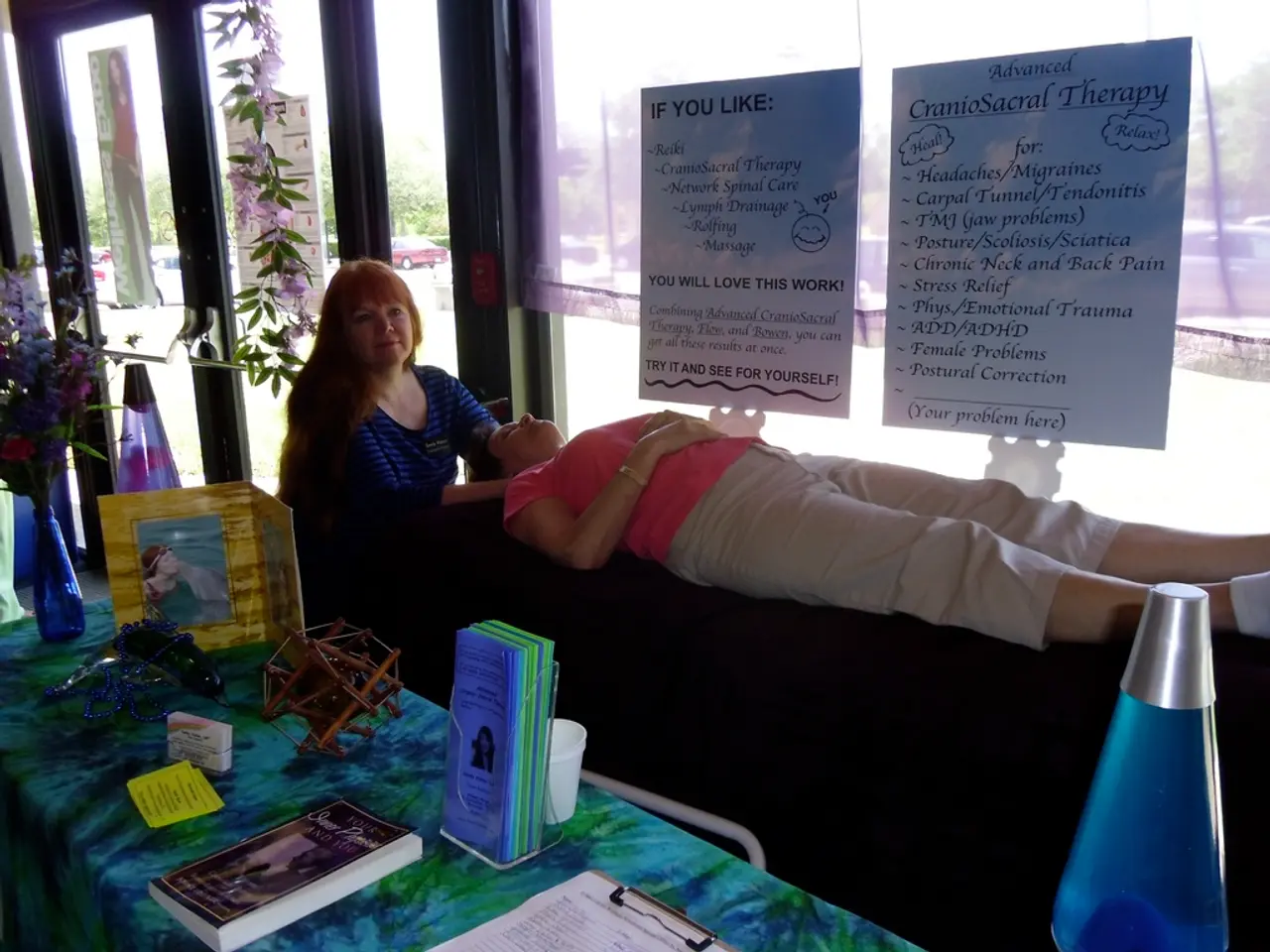Strategies for Reducing Anxiety: 14 Methods and Techniques
In the battle against anxiety, two therapies stand out as the most effective for those grappling with severe or persistent symptoms: Cognitive Behavioral Therapy (CBT) and Exposure Therapy.
CBT, widely recognized as the gold standard for anxiety treatment, works by helping individuals recognize and change negative thought patterns that contribute to anxiety. This therapy, which often involves mental exercises to challenge or disarm unhelpful, anxious thoughts, teaches practical skills such as thought journaling, mindfulness, grounding, behavioral experiments, and relaxation techniques. These tools help patients build tolerance to discomfort, face fears gradually, and improve emotional regulation and relationships affected by anxiety.
Evidence shows CBT often yields faster and more lasting results than other therapies and can be as effective or superior to medication long-term[1][2][4].
Exposure therapy, often integrated within or alongside CBT, specifically targets anxiety by gradually and safely exposing individuals to feared situations or stimuli. This helps reduce avoidance and build coping skills, which is especially useful for phobias, panic disorder, or post-traumatic stress disorder (PTSD)[2].
Other talking therapies, including various forms of psychotherapy, can also be beneficial, often tailored to the individual's needs and combined with medication if necessary. Access to care via platforms offering online psychiatric support is becoming more common, ensuring personalized treatment plans and follow-ups for anxiety management[3].
Benzodiazepines, a type of anti-anxiety medication, are for short-term use only due to the risk of dependence and withdrawal symptoms. Lack of sleep can exacerbate anxiety symptoms, and a good night's sleep is important for managing anxiety. Wind down activities, a cool and comfortable bedroom, warm bath or shower before bed, and avoiding screens close to bedtime can help improve sleep.
It's crucial to remember that anyone experiencing severe or persistent anxiety should consult a doctor. They may recommend medication, talking therapy, or a combination of these treatments. Alcohol does not solve anxiety and may worsen symptoms. Anyone facing challenges with alcohol intake should seek medical help.
In summary, CBT and exposure therapy form the cornerstone of effective talking therapies for severe or persistent anxiety, offering evidence-based strategies to manage and reduce symptoms in the long term.
### Summary of Effective Talking Therapies for Severe or Persistent Anxiety
| Therapy | Key Features | Effectiveness | |-----------------------|-----------------------------------------------|------------------------------------------| | Cognitive Behavioral Therapy (CBT) | Structured, goal-oriented; targets thought patterns and behaviors; teaches coping skills | Considered gold standard; effective long-term; can work alone or with medication[1][2][4] | | Exposure Therapy | Gradual exposure to feared stimuli or situations | Reduces avoidance and fear response; often used with CBT[2] | | Other Psychotherapies | Tailored approaches; often combined with medication | Can improve overall mental health and anxiety symptoms[2][3] |
Yoga, a form of fitness-and-exercise, can complement talking therapies for anxiety management by reducing stress and promoting relaxation. It's particularly effective for its mindfulness component, which aligns well with the principles of CBT [5].
A healthy-diet makes a significant impact on mental health. Consuming a balanced diet rich in fruits, vegetables, lean proteins, and whole grains not only boosts overall health but also supports a healthy immune system, potentially predictive of reduced anxiety symptoms [6].
CBD, a compound found in cannabis, is increasingly explored as a potential alternative or adjunct treatment for anxiety. While research is ongoing, some studies suggest CBD's anxiolytic (anxiety-reducing) effects could provide a promising alternative for those who prefer non-pharmaceutical options [7].
Stress, a common trigger for anxiety, can exacerbate skin conditions like eczema and psoriasis. By managing anxiety symptoms, individuals may experience fewer flare-ups associated with these conditions [8].
For instances of severe or persistent anxiety, implementing a combination of therapies and treatments, including cognitive behavioral therapy (CBT), exposure therapy, various psychotherapies, nutrition, healthy-diets, CBD, and wind down activities, can create an effective and personalized approach to anxiety management.
In the realm of health-and-wellness, integrating mental-health considerations, such as anxietymitigation strategies, alongside traditional fitness-and-exercise programs, can lead to overall holistic well-being.
Finally, remember that online platforms offering psychiatric support can lead to more accessible and personalized treatment plans, enabling individuals to manage their anxiety more effectively, while maintaining the importance of regular consultations with healthcare professionals.




